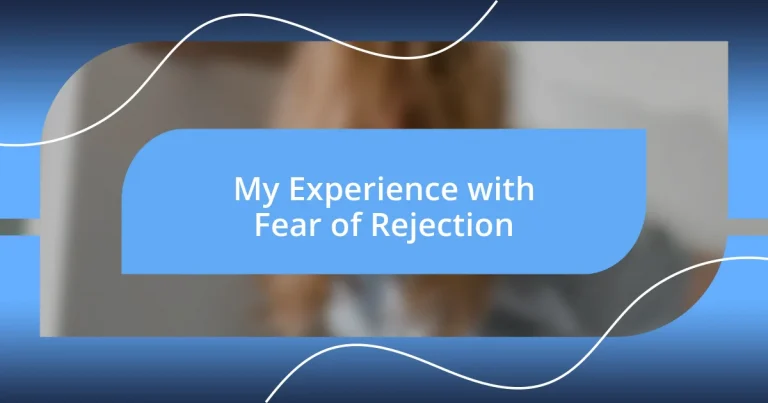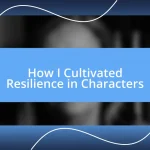Key takeaways:
- Fear of rejection often stems from past experiences and can manifest uniquely in different individuals, affecting social interactions and self-worth.
- Embracing vulnerability and sharing personal stories of rejection can foster deeper connections and resilience, while also re-framing negative experiences as opportunities for growth.
- Building self-confidence through techniques like daily affirmations, visualization, and setting small goals can help mitigate the fear of rejection and encourage proactive social engagement.
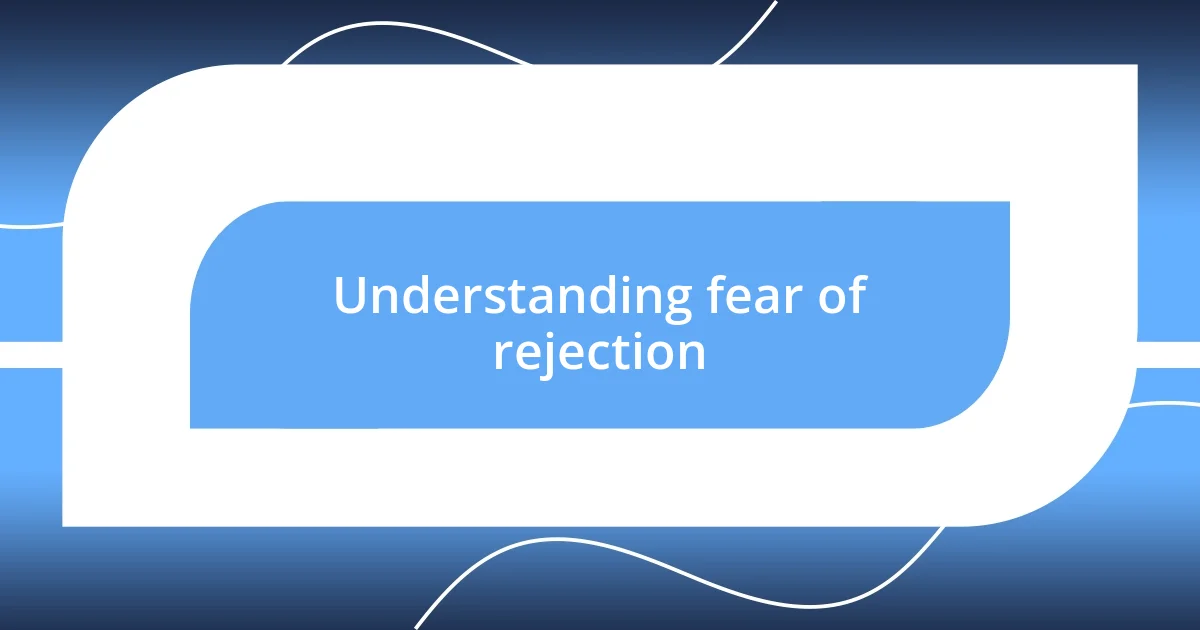
Understanding fear of rejection
Fear of rejection is a deeply ingrained human experience that often stems from our desire for acceptance and belonging. I still remember the first time I stood before a crowd to share my work, my heart raced at the thought of what they might think. What if they laughed? Reflecting on that moment, I realize it wasn’t just fear of judgment but a longing for connection.
When we understand that fear of rejection can be tied to our past experiences, it sheds light on its hold over us. For instance, recalling a moment from my childhood when I was left out of a friend group, I now see how that single incident shaped my expectations of social interactions. Have you ever had a moment that made you question your worth? I’ve learned that these moments can create mental barriers that sometimes feel insurmountable.
It’s fascinating how this fear manifests differently for each of us. Whether it’s hesitating to pursue a new romantic interest or avoiding a job application, I often wonder if more people share this internal struggle. It’s a poignant reminder that we must recognize our fears without allowing them to define us. By embracing vulnerability, I’ve found that opening up about these fears can lead to deeper connections, as others often share similar sentiments.
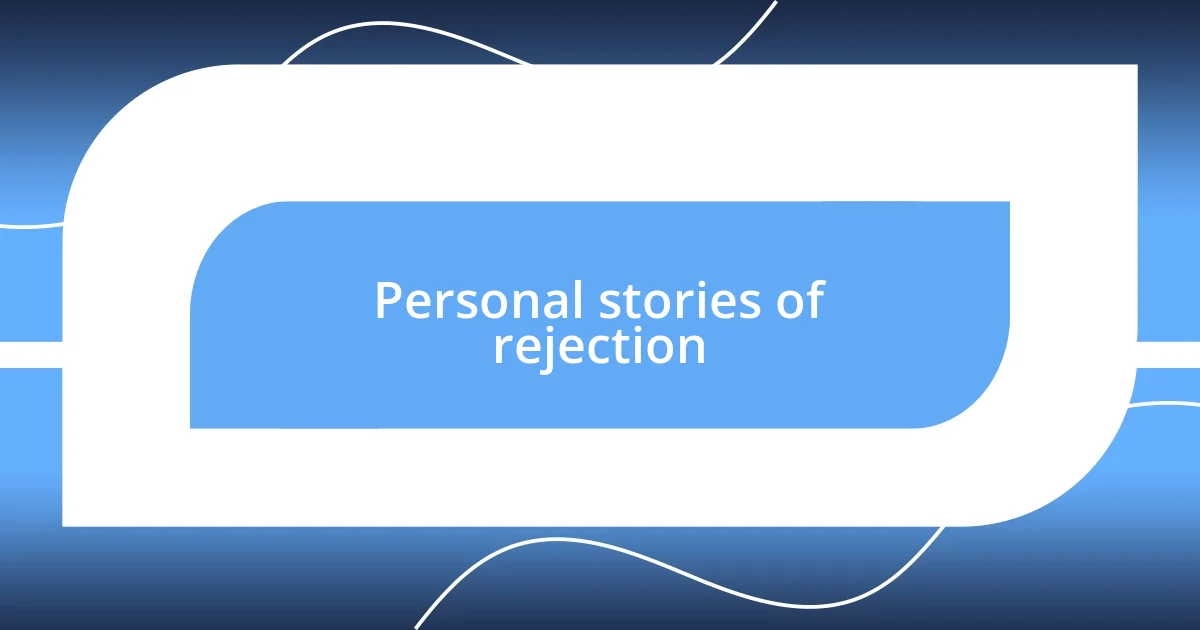
Personal stories of rejection
I remember the first time I asked someone out. My palms were sweaty, and my stomach was in knots. When they politely declined, it felt like a balloon had popped in my chest, leaving an emptiness that echoed with rejection. In that moment, I questioned everything about myself—was I not attractive enough? Did I come on too strong? It took a while for me to realize that rejection is often more about the other person’s circumstances than a reflection of my worth.
Years later, I faced rejection during a job interview that I had prepared for meticulously. I walked out feeling defeated, replaying my responses in my head, questioning my qualifications. But, as I reflected on it, I learned that sometimes the company’s fit is as pivotal as individual capability. The experience taught me resilience and the importance of self-compassion, reminding me that each rejection brings me closer to the right opportunity.
Another poignant moment was at a community gathering where I attempted to share my creative work. A friend chimed in with a sarcastic comment that stung deeply. I felt exposed and embarrassed, but later, I realized the irony in their reaction; my courage to share led the way for a more genuine connection with others who appreciated my vulnerability. Through these experiences, I’ve come to understand that rejection is an inevitable part of life, but embracing it can open the door to unexpected growth and meaningful interactions.
| Personal Stories | Lessons Learned |
|---|---|
| Asking someone out | Rejection is about circumstances, not self-worth. |
| Job interview rejection | Self-compassion fosters resilience. |
| Sharing creative work | Vulnerability can create genuine connections. |
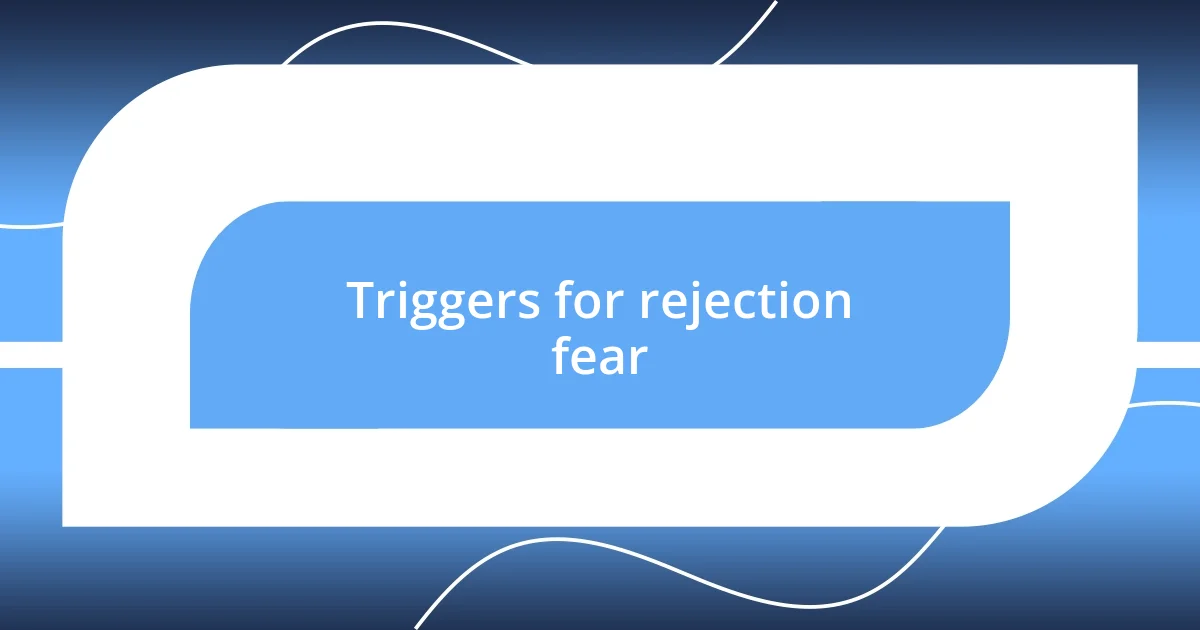
Triggers for rejection fear
Sometimes, the tiniest actions can trigger a wave of fear about rejection. For me, it was as simple as not getting a reply after sending a message to someone I admired. I vividly recall glancing at my phone, hoping for a notification, only to feel my heart drop when no response came. In that moment, every self-doubt resurfaced—was my message too bold? Did I misread their interest? Such triggers can often morph regular situations into anxiety-inducing experiences.
Here are some common triggers that can heighten feelings of rejection:
- Ignoring messages: The silence can lead to overthinking and assumptions about unworthiness.
- Being left out: Whether in group settings or social invitations, it can reignite past experiences of exclusion.
- Comments from others: A casual remark or offhand criticism can instantly amplify insecurities.
- Comparisons: Seeing someone else receive approval can trigger feelings of inadequacy.
- Past rejections: Memories of previous rejections can loom large, clouding present interactions.
Despite the familiar sting of rejection, I’ve found that reflecting on these triggers is the first step toward understanding my emotional responses. Confronting these feelings enables me to challenge the deeply rooted narratives that often come into play. By recognizing and dissecting these moments, I actively work to transform my fear into a catalyst for growth.
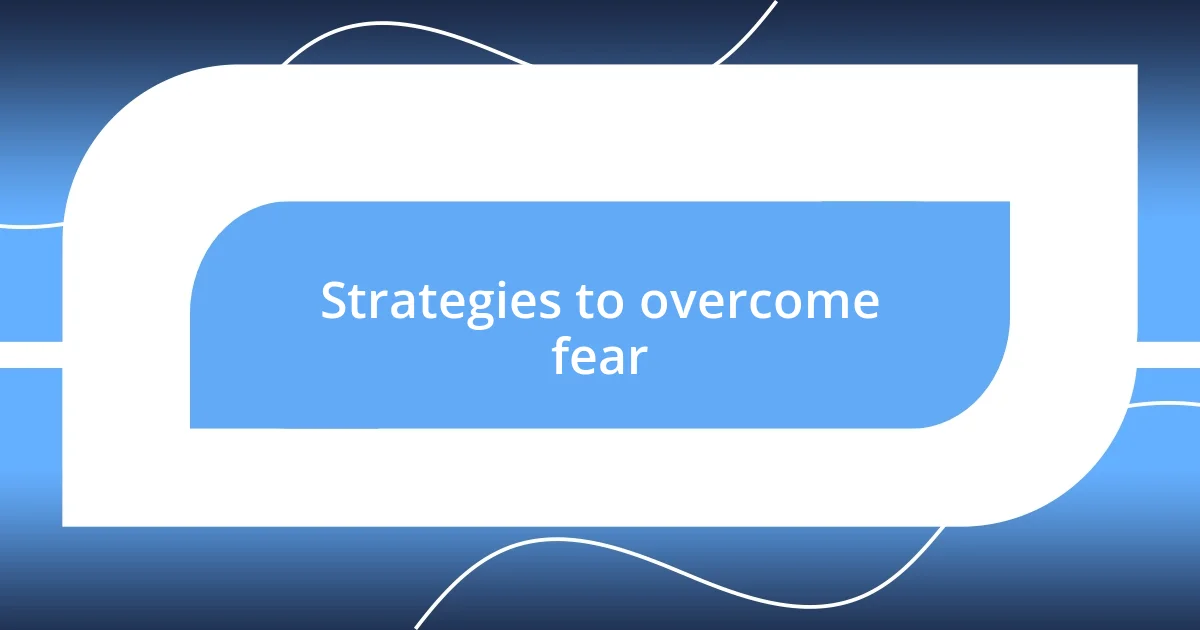
Strategies to overcome fear
Facing the fear of rejection is a journey I’ve navigated many times, and one strategy that has helped me immensely is practicing exposure. For example, I started small—asking a colleague for feedback on my work, even when I feared their response might be critical. Each time I put myself out there, I noticed that the anxiety gradually lessened. Have you ever noticed how sometimes the anticipation of rejection is infinitely worse than the reality?
Another effective strategy is to reframe my thoughts. I often remind myself that rejection doesn’t define my worth; it’s just one person’s opinion. After receiving constructive criticism on a project, I felt disheartened at first. But then, I reframed it: maybe this feedback is a stepping stone to improvement rather than a limitation on my capabilities. This mindset shift has turned moments of perceived failure into opportunities for personal growth, encouraging me to take risks that I may have avoided otherwise.
Lastly, building a supportive circle has been incredibly beneficial. I’ve connected with a group of friends who encourage vulnerability and validate each other’s experiences with fear. One evening, while sharing our stories over coffee, I realized we were all navigating similar struggles. How empowering it felt to be surrounded by people who understood the weight of rejection! Having this support has allowed me to approach new situations with greater confidence, knowing that I’m not alone in this journey.
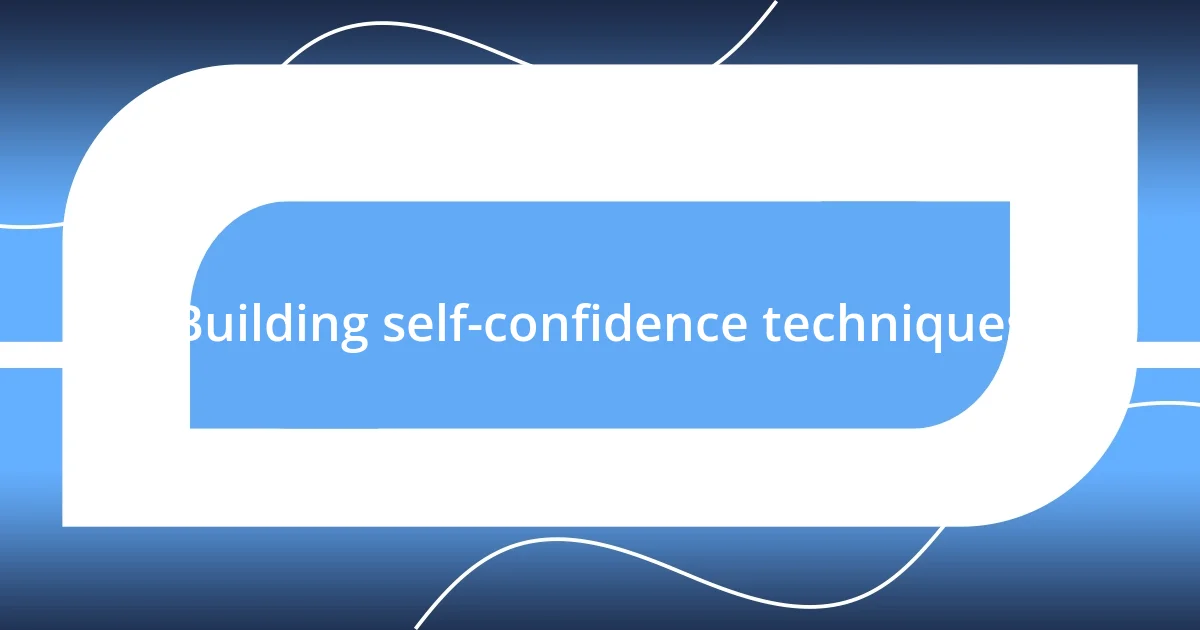
Building self-confidence techniques
Building self-confidence is an essential aspect of overcoming the fear of rejection, and I’ve discovered various techniques that have truly resonated with me. One of the simplest yet powerful methods is daily affirmations. I remember standing in front of my bathroom mirror, repeating phrases like, “I am worthy of love and acceptance,” and initially, it felt a bit awkward. However, over time, those words began to sink in, creating a foundation of self-belief that helped me confront fears with more courage. Have you ever tried affirmations? They can shift your mindset in remarkable ways.
Another technique that has transformed my self-esteem is visualization. I often take a few moments to close my eyes and imagine myself confidently approaching someone I admire and engaging in a meaningful conversation. During one particularly anxious day, I used this exercise before a networking event, picturing vibrant interactions and positive connections. When I arrived at the event, I felt surprisingly calm and open. It’s incredible how visualizing success can create a sense of preparedness, don’t you think?
Lastly, I’ve found that setting small, achievable goals can lead to big confidence boosts. Whether it’s initiating a new conversation or sharing an opinion during a meeting, each small success reinforces my belief in my capabilities. I started with a goal of talking to one new person each week. After a few weeks, I realized I was not just meeting new individuals; I was also discovering that many shared similar worries about connection. Celebrating these small victories has become a rewarding part of my journey, showing me how each step forward matters. How about you—what small goal might you set to kickstart your confidence-building journey?
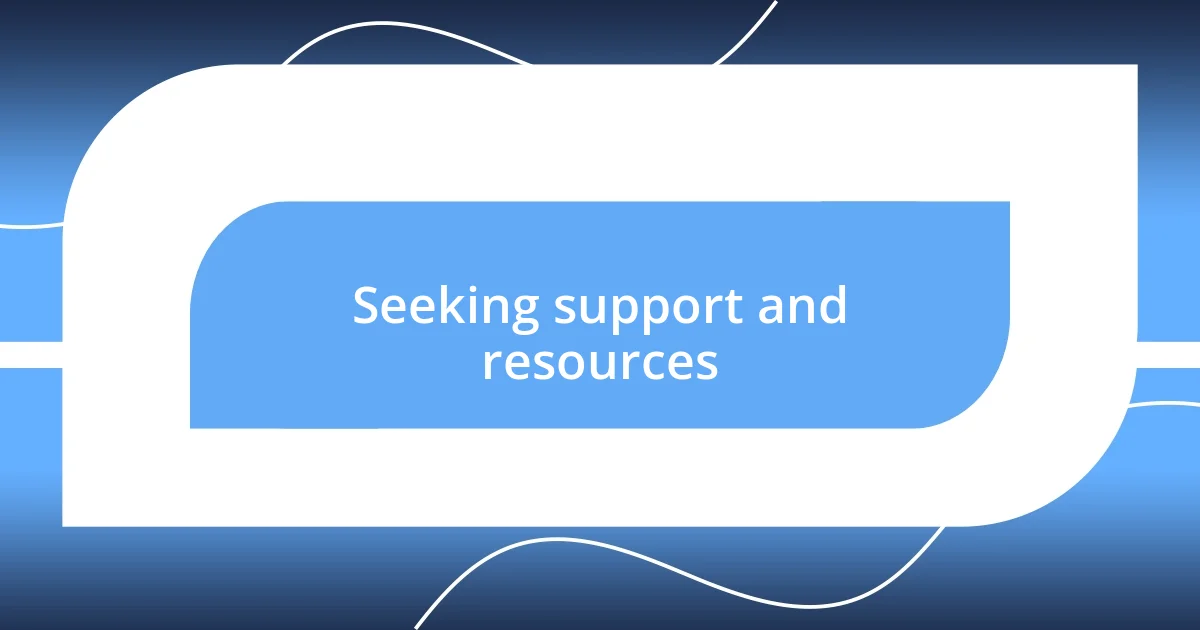
Seeking support and resources
Seeking support has been a game-changer for me in dealing with the fear of rejection. I vividly remember the first time I reached out to a therapist. It felt daunting, but sharing my feelings in a safe space opened up new avenues for understanding my fears. Have you ever thought about how simply talking to someone can lighten your emotional load? For me, it was like a weight lifted—realizing I wasn’t alone in my struggle.
In addition to professional help, community groups can provide incredible resources. I joined an online forum filled with people facing similar fears, and the shared experiences truly resonated with me. Reading about others’ challenges and triumphs not only provided validation but also practical tips I hadn’t considered before. I often wonder—what if I hadn’t taken that step to connect with others? That would have deprived me of a support system that bolstered my confidence and offered empathetic understanding.
Lastly, I found that educational resources, such as books and podcasts on overcoming rejection, enriched my journey. One particular book had a quote that stuck with me: “Success is often built on failure.” It reminded me that rejection doesn’t signify the end; it’s merely a part of the process. Exploring these resources gave me both inspiration and practical strategies to implement. Have you sought out ways to learn about managing your fears? This exploration has become a vital part of my growth, allowing me to view rejection through a new lens.
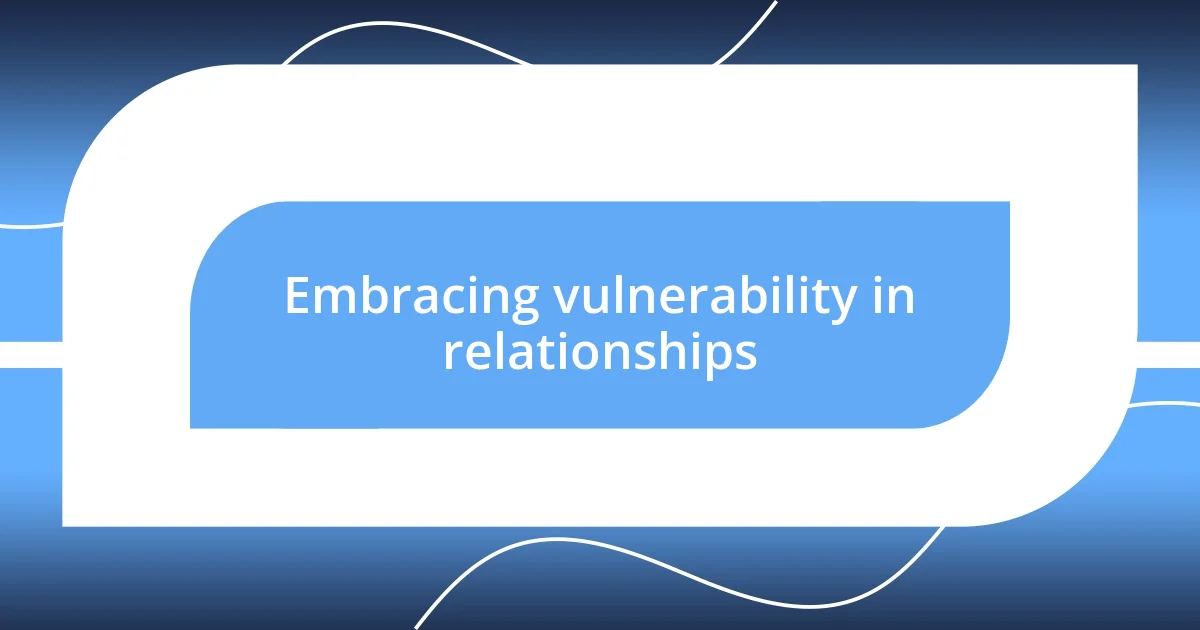
Embracing vulnerability in relationships
Embracing vulnerability in relationships can feel like stepping onto a tightrope. I remember the first time I allowed myself to be truly open with a close friend; my heart raced, and I worried about being judged. But, to my surprise, sharing my insecurities deepened our connection in a way I hadn’t anticipated. Have you ever experienced that transformative moment when vulnerability turned into strength?
When I think about vulnerability, I realize it often leads to profound healing. There was a time I shared my fear of rejection during a group discussion, and the room fell silent for a moment. Then, to my amazement, several others opened up about similar fears. The atmosphere shifted from discomfort to an infectious sense of camaraderie. I couldn’t help but think—could my honesty have sparked that sense of belonging?
Ultimately, embracing vulnerability isn’t just about overcoming fear; it’s about allowing yourself to be seen and appreciated for who you are. A while back, I had a significant conversation with someone I respected deeply, sharing my struggles with self-worth. The relief that washed over me was immense, and the trust it fostered created a safe space for both of us. Have you taken that leap of faith to share your true self? It’s in those moments that I often find the deepest connections flourish.












